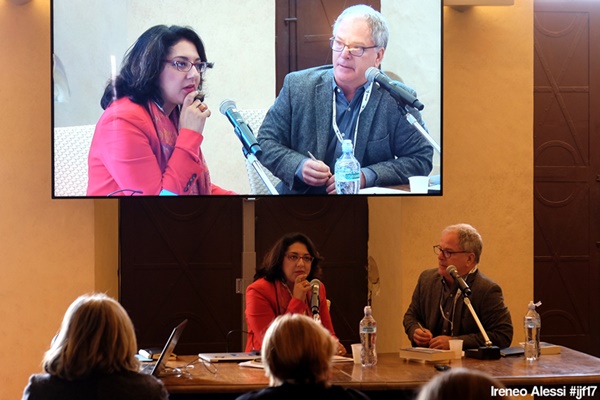
Abdusalam used to be a double secret agent; Salman was travelling in search his brother who (Salman didn’t know) was working with Al Qaida in Pakistan; Haiel happened to be in the wrong place at the wrong time. Abdusalam, Salman and Haiel are three of the 52 Yemeni imprisoned at the Guantanamo Bay. They all have families back home in Yemen demanding justice for them. Laura Silvia Battaglia, a freelance journalist who lives between Italy and Sanaa (Yemen), has told their stories in a book called ‘Postcards from Guantanamo’ that she presented on 6 April 2017 at the International Journalism Festival in Perugia.
‘Postcards from Guantanamo’ is a long-term project that Battaglia started in 2013, after she began travelling to Yemen (in 2012) and living there 6 months a year. Through these trips, Battaglia succeeded to meet six families of relatives of detainees at Guantanamo Bay who are still in prison. The book gathers dozens of letters from the detainees to their families where they describe their lives in Guantanamo, they imagine how their siblings would look like now, they pray… However, as the book shows, most of these letters are severally censored with lots of passages covered in black: “the most horrible things are untold” Battaglia says.
As Laura Silvia Battaglia explains, these families suffer from different types of stress: some of them did not know about the possible involvement of their relatives in terrorist related activities and blame them for the consequences for the family; others just want the accusations against their relvatives to be investigated in a trial: they want to know whether they are guilty or not, they want justice.
The situation of the Yemeni prisoners in Guantamo, explains Larry Siems (writer and human rights activist), is particularly hard. First, because the US Congress approved an amendment to ban transfers of Guantanamo detainees to Yemen, and therefore the Yemenis prisoners could only be transferred to third countries hence their families are afraid they would never see them again. And second, because there is a sort of hierarchy, a classes-structure in Guantanamo Bay: in fact, as Siems explains, the majority of those who remain at the Guantanamo Prison are from poorer countries, which have little capacity and leverage to negotiate with, and influence, the US administration.
The untold stories of the prisoners in Guantanamo Bay
Laura Silvia Battaglia explains that the hardest part of her work has been building trustworthy relationships with the families of the detainees, to avoid being perceived as a spy. Another challenge has been checking the families’ stories, as there is always a chance that they could lie to you, which occurred at least once to Ms. Battaglia.
The case of Abdusalam Al-Heila is the classic ‘bad guy story’. Al-Heila was a Yemeni double secret agent. He was detained in Egypt, then transferred to a secret prison in Jordan and then to Guantanamo. Although it has been proved that he had worked as a recruiter for Al Qaida, according to Battaglia, his family described him as almost a saint. They reclaim for information about his detention.
Fawaz Al-Raeyée had told his family that he moved to Germany for business reasons. And he was indeed sending a lot of money back home. The family did not know at that time that Fawaz was not doing any (legal) business but rather was working for Al Qaida. His younger brother, Salman, had travelled to Pakistan to look for him. It was shortly after the 9/11 attacks when Salman was detained in Pakistan and sent to Guantanamo. However, his older brother, Fawaz Al-Raeyée (the one who was working for Al Qaida) was never detained. Her sister Amina was the first Yemeni relative to a Guantanamo detainee to seek for help of a local lawyer, to claim justice for Salman.
Another story of being in the wrong place at the wrong time is the Haiel Al-Metham case. Haiel is a well-educated young Yemeni, with a degree in French and English languages, who, being unemployed in Yemen, moved to Pakistan where he was offered a job as a teacher. Soon after 9/11 happened, he was detained in Afghanistan and transferred to Guantanamo Bay.
The other side of the history
For years, US journalists have been talking about the stories of Guantanamo prisoners as a matter of “human rights”. They put the focus on the need to put an end to torture and inhuman treatment, and to ensure access to legal advice and fair trials… However, only few journalist have approached this topic as a “human interest” story, i.e. focusing on the personal and family histories of the detainees. This is instead the particularity of ‘Postcards from Guantanamo’ and this is why this book is so important.
Moreover, Laura Silvia Battaglia focused her book not only on the stories of the Yemeni families, but also, she aimed to draw a picture of the US civil society. Battaglia interviewed US lawyers, activists and even soldiers who have worked in Guantanamo and who now experience post-traumatic disorders caused by the things they were forced to do there. Ms. Battaglia tells the story of Terry: Terry lost her sister in the 9/11 terrorist attacks and she wanted to understand why, so she travelled to Iraq. There, she soon became an active supporter of Iraqi civil society. Then she moved to Yemen, where she joined the protests of the Guantanamo prisoners. She shares the demand of truth: in her case, she wants to understand whether the claims on the detainees are correct, and she wants to find out who actually was guilty of the 9/11 attacks. However, Laura Silvia Battaglia commented that Yemeni families do not have much hope in the new US administration… and they were already losing it when Obama was at the White House.
These are just few of the stories of Guantanamo, Battaglia tells the audience, and this is still happening, the families are still waiting for justice, or at least for a postcard from Guantanamo.